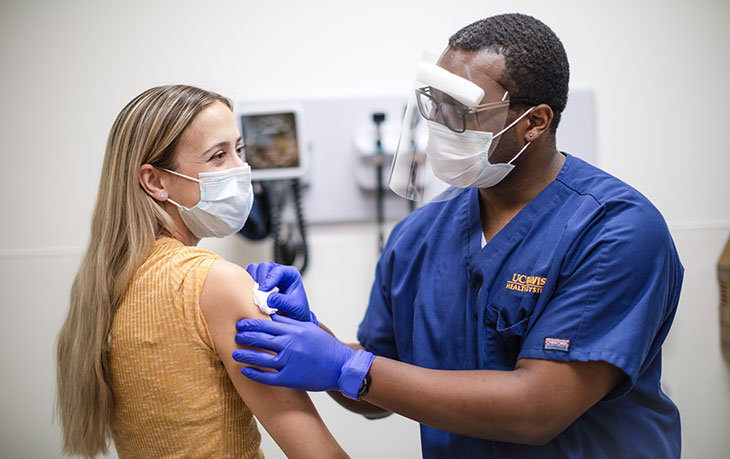
The winter months often mean getting cozy by a fire or drinking your favorite warm beverage. However, the cold weather can also bring a lot more sniffles and illness.
While many of us have let down our guard with COVID-19, it's still circulating in our community. And now, it's also flu season.
Here is some information from our UC Davis Health experts to help keep you safe.
Are there different COVID-19 symptoms and flu symptoms?
Both the flu and COVID-19 are contagious respiratory illnesses. But they are caused by different viruses. Symptoms of COVID-19 and flu can be very similar, and people can have both at the same time.
Here are a couple differing symptoms:
- COVID can cause diarrhea for all ages (typically only children have diarrhea when they get the flu).
- Change in or loss of taste and smell is more common with COVID-19.
Infants, children and teens are most likely to get sick from the flu. But it's important to note that anyone at any age can get the flu or COVID-19.
Read more about COVID symptoms and at-home tests
Should you get a COVID vaccine and a flu vaccine at the same time?
If you are not up to date on your COVID-19 vaccine, you can get a COVID vaccine and a flu shot at the same time.
Studies conducted throughout the COVID pandemic showed that it's safe to get both the flu and COVID vaccines at the same time.
Getting vaccinated against COVID and the flu is a safe method to help prevent serious illness and hospitalization.
Read more: 7 facts about the flu and why you should get a flu shot
Learn who should get a COVID-19 vaccine (CDC)
Are there side effects of getting either a flu shot or a COVID-19 vaccine?
Side effects vary from person to person. The most common side effects of a COVID vaccine are a sore arm and sometimes fever, chills, tiredness and headaches for a day or two.
Common side effects after a flu shot include soreness, redness and/or swelling where the shot was given. You may also experience a minor headache, fever, nausea, muscle aches, and fatigue.
If you experience a serious reaction to either vaccine, call your health care provider right away.
Learn why you should partner with a primary care provider
Can I wait in between getting a COVID vaccine and a flu shot?
Yes, if you feel more comfortable having some time in between, that's fine too. There's no recommended waiting time between getting one and then the other.
Since flu season in the U.S. is from about October to April, with peak activity in December and February, it's recommended that you get a flu shot as soon as possible. You should also stay up to date on your COVID vaccines, in alignment with CDC recommendations.
Where can I get both a COVID vaccine and a flu vaccine?
If you're a UC Davis Health patient, call your primary care clinic to schedule an appointment for both vaccines. For those just looking for a flu shot, our primary care clinics are taking walk-ins during regular office hours. For UC Davis Health patients who only want a COVID vaccine, you can make an appointment on your MyUCDavisHealth portal. You can also call 800-2-UCDAVIS (800-282-3284) Monday-Friday 8 a.m.-5 p.m.
Anyone can also schedule a flu and COVID-19 vaccine appointment on the state of California's My Turn scheduling portal. The U.S. government also has vaccine location information for adults and children.
Learn about COVID-19 testing from UC Davis Health
This blog was medically reviewed by Dean Blumberg, chief of pediatric infectious diseases.




